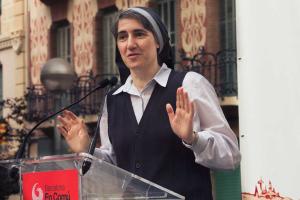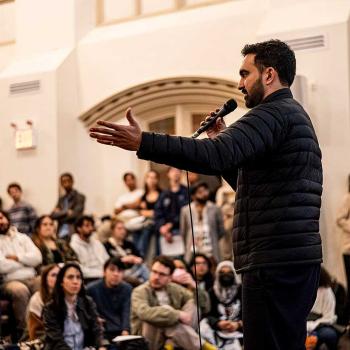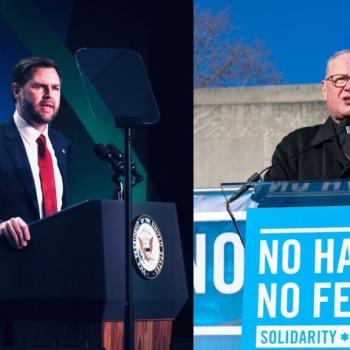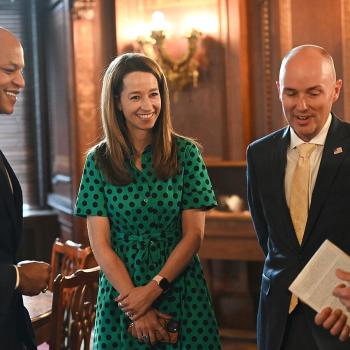
Telling Good Religion Stories
Religious, spiritual and faith-inspired actors have long shaped public responses to some of society’s most urgent shared crises—from welcoming the stranger to caring for creation. Yet in much of the media coverage around issues like immigration, the economy, gun violence, and the environment, engaged voices of faith are often oversimplified, sidelined, or portrayed in a critical manner.
But what if we focused on good religion stories instead?
In a forthcoming anthology combining journalistic narrative with social-scientific reflections, titled Engaged Spirituality: Stories of Religious Resilience, Inspiration, and Pursuit of the Common Good, I and 17 other authors explore the power of telling such stories. But with an unexpected twist. Or you might say, a surprise ending: that telling good religion stories helps us to look beyond the present, imagine a new repertoire of the possible, and rise together to advance vital conversations around some of the most critical issues of our time.
The anthology emerged out of the Spiritual Exemplars Project, sponsored by the University of Southern California’s Center for Religion and Civic Culture, which involved a team of journalists and researchers profiling 104 spiritually-engaged humanitarians across 13 faith traditions and 42 countries.
The exemplars, individuals motivated and sustained by spiritual values, beliefs, and practices to serve humanity, included a nun who performed the first Buddhist same-sex wedding, a Jewish lay leader who served more than 2 million meals to food-insecure college students, a priest who helped rescue 150,000 distressed refugees in the Mediterranean Sea, a Jain who served more than 400,000 people in 400 Sri Lankan villages and a Latina convert who founded the first shelter for Muslim migrants at the U.S./Mexico border.
Their lives, inspired by African Religious traditions, Baha’i precepts, Protestant ethics, Humanist altruism, and Indigenous spirituality, highlighted some of humanity’s highest shared values in pursuit of the common good.
During the project, team members realized they were not only gaining insights about how spiritually engaged humanitarians understand their lives and work, but about how religious values and spiritual practices inspire and sustain social action on a larger scale. This anthology is an outgrowth of that process, taking readers on a journey to meet people doing extraordinary work and to share their life trajectories, traumas, and triumphs.
Listening to the Human Story
As the 21st-century grinds on, beset as it is with humanitarian crises and internecine conflict, environmental degradation and deadly global diseases, economic disparity and debates around gender, cultural identification and education, we need good religion stories.
In a world so often divided, torn apart by what seems insurmountable polarity, religion stories told from across traditions remind us to break through our own narratives, or those of “our people,” and listen for a while to the story of humanity as a whole.
Narratives, especially in the hands of quality storytellers, provide a measure of truth and a degree of significance to individual lives. They also preserve the memory of deeds across time, and thus, enable the actions of others to become sources of inspiration — for the “gap between past and future,” as German American historian Hannah Arendt put it; that is, models to be imitated, and, if possible, surpassed.
That’s why I believe good religion stories are worth our time. And by “good religion stories” I not only mean stories highlighting the best of religious resilience, inspiration, and pursuing the common good, but well-written narratives about religion and all its human adherents — their simultaneously messy, masterful and magnificent lives; their faults, foibles, and failures too.
Take, for example, the story of Muhammad Elgazzar, a “savior surgeon,” who rescued countless lives on both sides of conflicts in Yemen and Syria, Libya and South Sudan. He’d been the one to train the famed White Helmets in Syria on how to perform emergency first-aid, rushed to Tahrir Square at the height of the Egyptian government’s crackdown on the people’s revolution, and been at the edge of death himself while trying to save lives during Sierra Leone’s civil war. At the same time, he had an ego and a self-image he sometimes ruthlessly sought to protect.
Then there is Teresa Forcades i Vila, profiled by Linda Freund, a Benedictine nun known for her radical — and public — disagreements with the Catholic

Church on abortion, contraception, same-sex marriage, and women’s ordination. She is also a prominent vaccine skeptic who criticized pharmaceutical companies and faced accusations of spreading misinformation during the COVID-19 pandemic.
Or Makvala Margoshvili, a Kist woman working to promote and develop tourism, dispel myths about Islam in Georgia, as well as lift up rural women in the country’s Pankisi Valley. According to journalist Clément Girardot, as heroic as she was, Margoshvili was not recognized nor widely known during her lifetime. In the wake of her passing in 2021, however, her legacy lives on and her biography continues to inspire.
Such stories not only present an honest look at the world of religion, they help us rediscover ourselves and our collective futures in the process.
In other words, good religion stories help us look beyond — beyond the suffering and limitations of human life on earth, beyond the horizon of what we now know or presently apperceive, and beyond the limited view often offered about religion in the news media.
A New Repertoire of the Possible
As one firmly invested in the field of religion news, I agree with media studies scholar Stewart Hoover who said the subject of “religion” seems to be tailor-made for good journalism rather than an excuse for avoiding it. “If the world of religion seems complex and unexplainable,” he wrote, “it is the role of the professional journalist to attempt to demystify and explain it.”
Although “negative coverage of religion by the media is necessary and useful because it provides a critique of…religion that is corrupt and authoritarian,” we also need stories about religious actors doing good — exploring what it looks like for people to address evils ranging from genocide and torture to spiritual abuse and everyday inequality.
Although readers may not walk away believing in karma or the afterlife, the power and humanity of these portraits will inspire them to see how articles of faith, religious values, and spiritual commitments can help us reimagine the way we engage the tangible, troubling realities of our shared existence.
These stories can help us not be depressed or discouraged about the state of the world but inspired to take a more positive attitude toward the challenges we hold in common. In short, they help us imagine a new repertoire of the possible, for ourselves and the world around us.
In the face of this century’s growing challenges, it is evident that our world needs new systems of care – structures that transcend divisions of race, class, caste, gender, nation, religion, ability, sexuality or political orientation.
As pandemics and calamities related to the climate crisis threaten lives and our collective survival; as human flourishing falters instead of flowering; as the delivery of quality aid, education, and healthcare is challenged by the demands of global capitalism; as human suffering on massive scales continues to confront us in the media; and as human divisions appear to grow ever deeper, such stories highlight humans across the globe trying to build such systems of care and foster new communities of compassion.
Their paths are all different. Their callings too. Their work on our shared planet’s most pressing issues not yet finished. Perhaps they will succeed. Perhaps they will fall short and fail.
But together, the chapters of their lives stand as testaments to the power of a good story to help us all get there.













